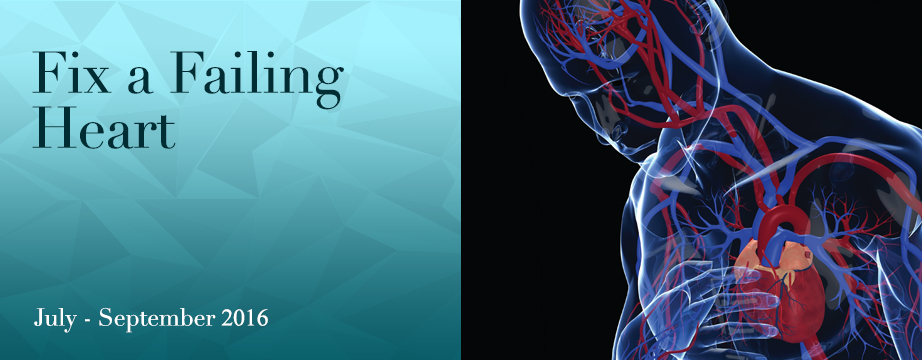
| Heart failure does not always mean that your heart is about to stop working. But it is a serious condition that requires medical intervention and lifestyle changes. |
| The heart functions as a pump to transport blood through the major organs so that they receive nutrients and can remove waste materials from the system. Heart failure occurs when the heart loses its ability to pump blood to the rest of the body. When the heart fails, vital organs such as the lungs, kidneys, brain, liver and the digestive system are affected. |
| Heart failure usually develops after other conditions have damaged or weakened the heart. It can also result when the heart’s main pumping chambers (ventricles) become so stiff or dilated that they are unable to fill properly between beats. Over time, the heart can no longer fulfil its primary role of pumping blood efficiently. |
| Warning signs |
| Early symptoms of heart failure include shortness of breath and cough. As the condition progresses, congestion in the lungs can cause breathing difficulties. At the same time, fluid may accumulate in the lungs’ air sacs, liver and intestines, leading to abdominal swelling, pain and digestive problems. |
| Fluid can also build up in the patient’s legs and ankles due to gravity. Such fluid will be reabsorbed into the bloodstream when the patient lies down, which in turn can flood the lungs and aggravate breathlessness. As a result of inadequate blood supply, the kidneys may begin to fail. Low blood pressure and fainting spells may also occur. |
| Diagnosis is based on the abovementioned symptoms and tests such as echocardiogram, X-rays and blood tests. |
| Causes and risk factors |
| Coronary artery disease and heart attack |
| Coronary artery disease is the most common cause of heart failure. Arteries that supply blood to the heart muscle become narrowed by fatty deposits (a process called atherosclerosis). A heart attack occurs if plaque formed by the fatty deposits ruptures. This causes clotting that may cut off blood flow to an area of the heart muscle, impairing the heart’s pumping ability and often leaving permanent damage. If the damage is significant, it can lead to weakened heart muscles. |
| High blood pressure |
| If you have high blood pressure, your heart has to work harder to circulate blood throughout your body. To compensate for the extra work, the heart muscle may thicken and eventually become too weak or stiff to effectively pump blood. |
| Congenital heart defects |
| A hole in the heart is a congenital defect that results in inadequate circulation of oxygenated blood. If your heart chambers and/or valves are not formed or do not function correctly, the other parts of your heart have to work harder to pump blood, leading to heart failure. |
| Abnormal heart rhythms |
| Normal heart rhythm (otherwise known as sinus rhythm) enables the heart to function most efficiently. The upper chambers contract first, followed by the lower chambers. Abnormal heart rhythms may make your heart beat too fast or too slowly, or may make the heart contract in an uncoordinated fashion. Atrial fribillation is the most common type of arrhythmia. |
| Abnormal heart rhythms may weaken your heart over time. Conversely, a slow heartbeat prevents your heart from getting enough blood out to the body and may also lead to heart failure. |
| Heart muscle damage |
| Cardiomyopathy, a disease that progressively weakens the heart muscle and reduces its ability to pump blood, may be caused by inherited heart muscle disorders, infections, alcohol abuse and the side effects of cancer treatment drugs. Myocarditis is an inflammation of the heart muscle typically caused by a virus and can lead to heart failure. |
| Other diseases |
| Chronic illnesses such as diabetes and hyperthyroidism (overactive thyroid), and conditions like severe anaemia and sleep apnoea can put patients at risk of heart failure. |
| Treatment options |
| Treatment depends on the type and severity of the heart failure. It is critical to address the underlying causes and reduce symptoms, in order to stop the condition from deteriorating. In some cases of heart failure, the right and left sides do not contract at the same time. To correct this problem, the doctor may implant a pacemaker to synchronise the contractions and relieve heart failure symptoms. |
| Patients with heart failure may have a rapid, erratic heartbeat that can lead to sudden cardiac arrest. Catheter ablation is a procedure to eliminate a faulty electrical pathway that is prone to developing cardiac arrhythmias. Implantation of an implantable cardioverter defibrillator (ICD) serves to monitor your heart rate and use electrical energy to correct irregular heartbeats. |
| Treatment options for patients with advanced heart failure include artificial heart implants and heart transplant. A heart transplant is surgery during which a diseased heart is replaced with a healthy heart from a deceased donor. In most cases, heart transplants are performed on patients with end-stage heart failure. Due to the shortage of heart donors, the implantable artificial heart is often the only viable option. |
| Living with heart failure |
| When symptoms are well managed, patients can continue to lead full and enjoyable lives. These lifestyle changes also play an important part in improving your condition: |
|
 DR RUTH KAM
DR RUTH KAMCardiologist
MBBS (Singapore)
MRCP (Int Med) (UK)
M Med (Int Med) (Singapore),
FAMS (Cardiology), FRCP (Edin)
Ruth Kam Heart and Arrhythmia Clinic
1 Farrer Park Station Road, #07-11 Connexion
Farrer Park Medical Centre, Singapore 217562
Tel: 6443 0468
www.arrhythmia.com.sg
1 Farrer Park Station Road, #07-11 Connexion
Farrer Park Medical Centre, Singapore 217562
Tel: 6443 0468
www.arrhythmia.com.sg



